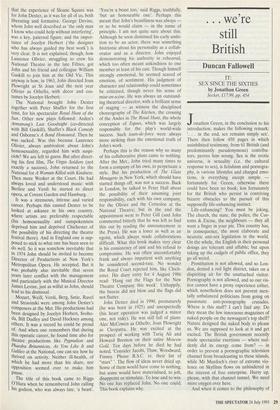. . . we're still British
Duncan Fallowell
IT: SEX SINCE THE SIXTIES by Jonathan Green Secker, £17.99, pp. 454 Jonathon Green, in the conclusion to his introduction, makes the following remark: `. . . in the end, sex remains simply sex'. There then follow 450 pages in which uninhibited testimony, from 61 British (and predominantly pseudonymous) contribu- tors, proves him wrong. Sex is the erotic universe, is sexuality (i.e. the cultural response to sex), is fetishism and pornogra- phy, is various lifestyles and charged emo- tions, is everything except simple fortunately for Green, otherwise there could have been no book; less fortunately for the British who persist in contriving bizarre obstacles to the pursuit of this supposedly life-enhancing instinct.
Life-enhancing? You must be joking, The church, the state, the police, the Cus- toms & Excise, the neighbours — they all want a finger in your pie. This country has, in consequence, the most elaborate and neurotic anti-sex legislation in the world. On the whole, the English in their personal doings are tolerant and affable; but upon taking up the cudgels of public office, they go all weird.
Prostitution is not allowed, and so Lon- don, denied a red light district, takes on a dispiriting air for the unattached visitor. Pornography is not allowed, and so our vis- itor cannot have a proxy experience either, which nonetheless does not prevent men- tally unbalanced politicians from going on passionate anti-pornography crusades. Where is this stuff? I can't find any. Do they mean the few innocuous magazines of naked people on the newsagent's top shelf? Nature designed the naked body to please us. We are supposed to look at it and get excited. The British government recently made spectacular exertions — where sud- denly did its energy come from? — in order to prevent a pornographic television channel from broadcasting to these islands, while Mr Murdoch's river of extreme vio- lence on Skyfilms flows on unhindered in the interest of free enterprise. Hurry up, please, with that channel tunnel. We need more oxygen over here.
And when it comes to the philosophy of
choice, remember that you cannot choose the person you want to sleep with. Homo- sexual activity is not allowed to men under 21, and is forbidden to all men except in a one-to-one encounter, behind locked doors, in an otherwise uninhabited house- hold. I once asked a Tory MP, who was homosexual and who voted in favour of Clause 28, to sponsor a bill to reduce the homosexual age of consent. His reply was, `Boys don't know who they are until they are 21.' Do we ever know who we are? Does it matter? But the thinking seems to be that the heterosexual impulse in Englishmen is a fragile plant compared to its continental counterparts and requires this exaggerated legal protection to ensure its survival.
Picking people up is not allowed. It is called loitering with intent, or soliciting, or obstruction. The idea that sex is permissi- ble, let alone pleasurable, is foreign to the British mind. And, if driven to despair by all this gobbledegook, you decide to flop into a chair and simply order a drink, that's not allowed either because it's just after 11 pm. In the recessive post-imperial era, British frigidity — the refusal to grow up — amounts to something which threatens not only our pleasures but also our sur- vival: a refusal of life itself.
In this book one may discern the wave- like opening and closing of doors of oppor-
tunity over the last 30 years. Britain is less strapped down than it was, but the forces of repression remain strong and offensive. For example, the neo-feminists are merely Mary Whitehouses in Levi jackets. And the fact that over half the contributors were terrified of letting themselves be identified creates an involution which amounts to prurience: shame, like laughter, is conta- gious.
Much of the material is cranky — plenty of people like one Hugh Pratt who says with a straight face, 'Love the homosexuals, hate the homosexuality'. Much of it is extravagant — but the extravagantly revealed foible is the secret of good sex. Much of it is amusing — long, Alan Ben- nett-style monologues, but with balls. And this is a very democratic book. Everyone is allowed their say, although since books cannot be democratic, this one is really a dossier. My own contributions have been meticulously transcribed, including errors of diction, and I am chastened by having come face to face with my windiness of expression — I had imagined I was being terrifically terse and clever.
There are only two ways of discerning Mr Green's own preferences or attitudes. The first is by the amount of space he allows to each of his categories: the chapter on pornography is by far the longest. And here one learns that 40 per cent of porn videos are taken out by women and that on the whole women pre- fer gay porn because the quality of man is superior.
The second way is by what he leaves out. I also gave him what I thought — obviously erroneously — was some unexpected mate- rial on bisexuality. But he is very pre- dictable in his categories, which are as follows: sex education, virginity, swinging, feminism, gay liberation, pornography, Aids, religion, bondage, the New Age. Surely bisexuality deserved some coherent investigation? It is the most interesting form of sexuality because it is the most upsetting, the richest in possibilities, suggesting a deeper and more far-seeing temperament than that of gay or straight. It is also the obvious growth area for the future.
Sex across racial and national barriers should have had a category. This is another growth area since the Sixties, the result of travel and immigration. It is exciting and sometimes dangerous. I was in a London steam-room recently when two Arabs entered wearing their underpants. A young Cockney asked them, 'Why are you wear- ing underpants?' to which one replied, `Only a dog exposes its genitals.' And we think we've got problems! Well, we have. In the men's sauna (not mixed) of the Lillie Road Pools, run by Hammersmith and Ful- ham Council, is a notice which reads `Please wear swimming-costumes to avoid embarrassment.' This is kinky.
There should have been a category on sex and violence. There is, of course, a cor- relation between sex and violence which it is useless to deny: lack of sex pro- duces violence. Why did Mr Green inter- view no sex criminals? His approach is blithe — but how many rubber sheets do we need? Or am I simply getting too real?
There should have been more on sex education — it is still impossible to imple- ment proper sex education in British schools. There should have been more on virginity, because so many sex problems come from the misplaced veneration of vir- ginity and innocence. Virgins after puberty and celibates smell bad. They have not learnt about personal hygiene through interaction with their fellows. They are psy- chologically blocked and usually yearn for induction into the human story by an out- sider.
Of course the subject is so huge, a series of endlessly propagating Sargasso Seas. But it is always good to be reminded that sex is not simply sex, is not about making babies, the mass-production of flesh being only one by-product of this much more funda- mental, all-embracing human engagement. Mr Green's book contains much to enjoy and much to ponder; and may even become a tool with which the British can abet the exploration— or better, the subversion — of their dingy state of affairs.



















































 Previous page
Previous page